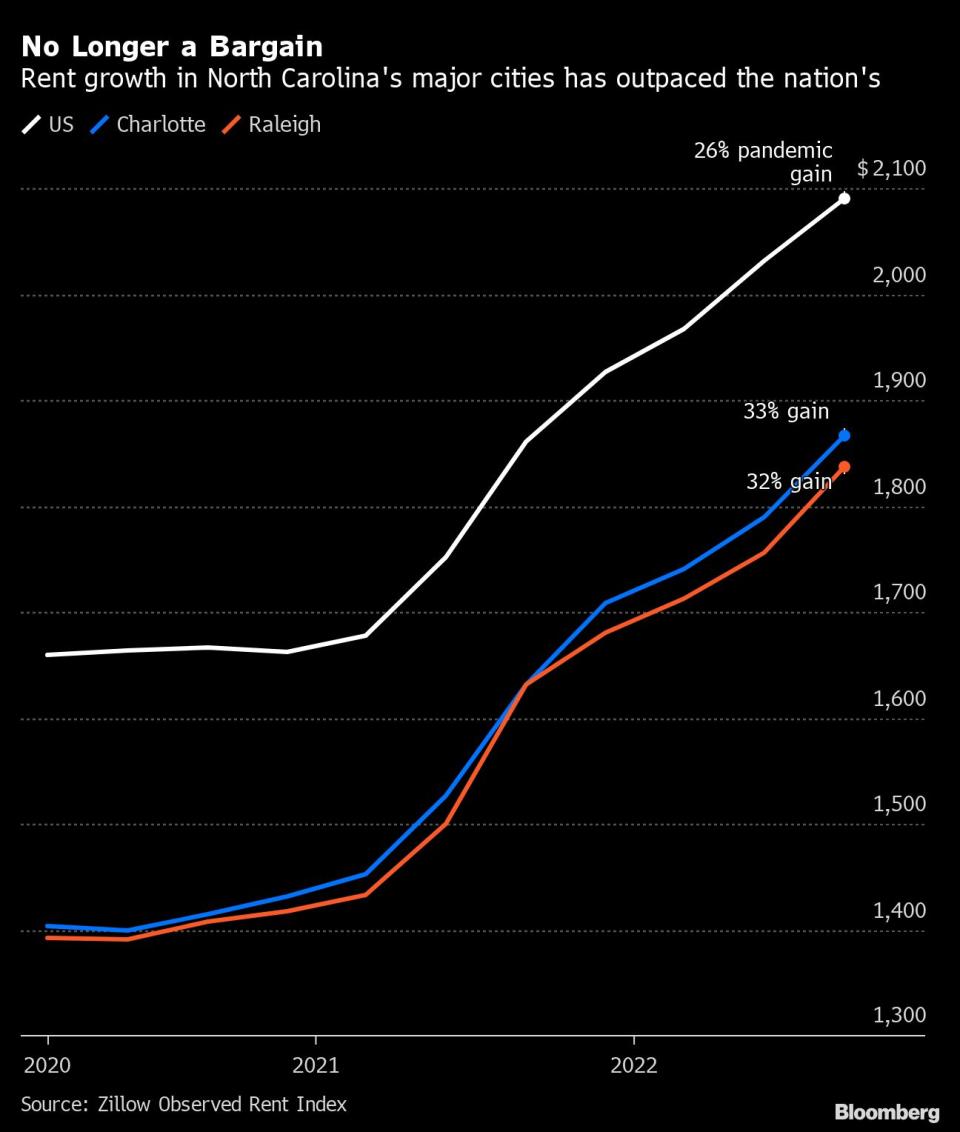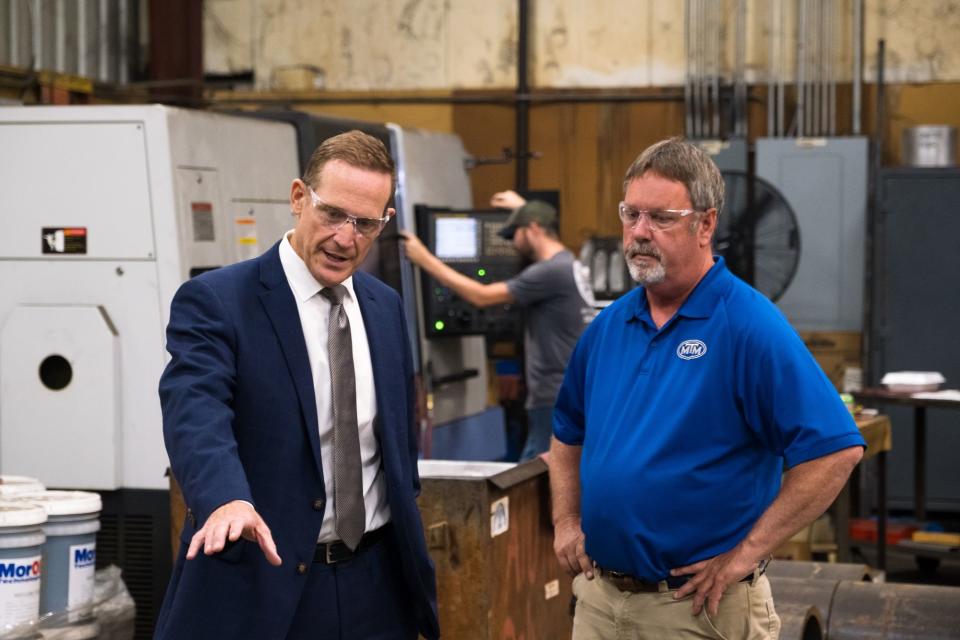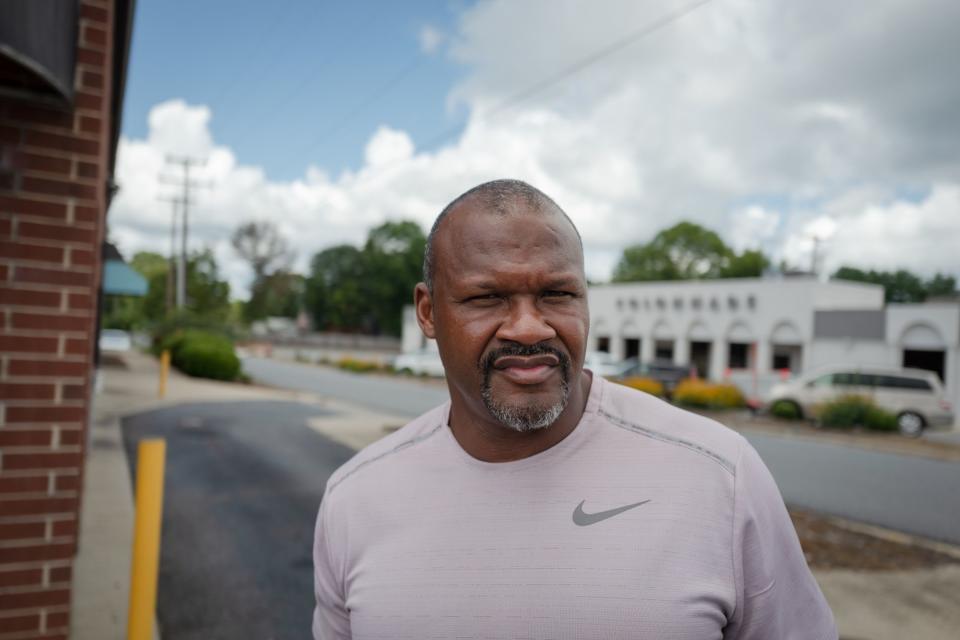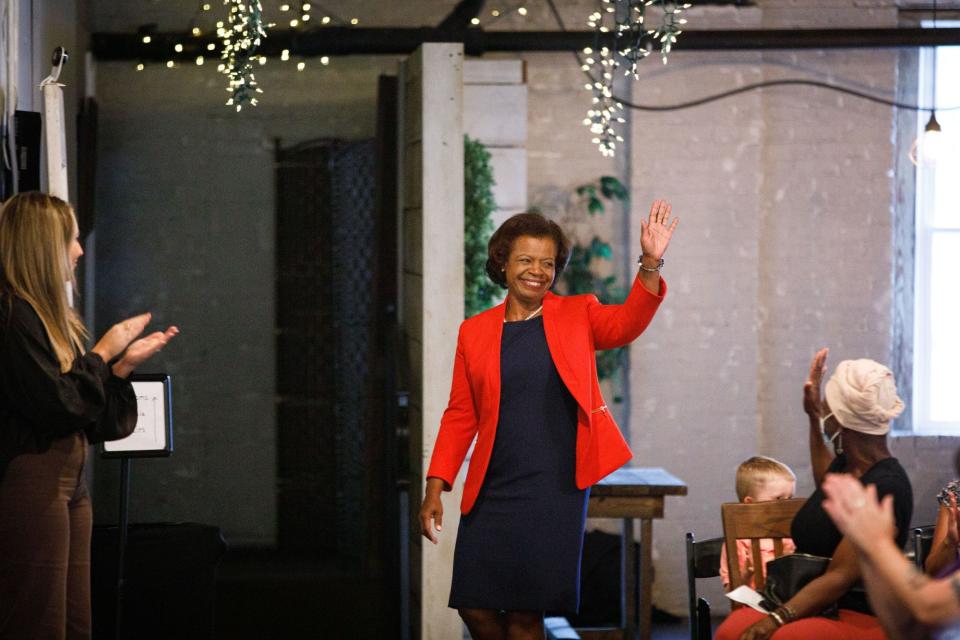North Carolina Is Now a Critical Swing State Thanks to Influx of Tech, Finance Jobs
- Oops!Something went wrong.Please try again later.
(Bloomberg) -- In North Carolina, where a neck-and-neck Senate race could help determine which party controls that chamber of Congress, inflation and abortion rights are colliding in voters’ minds and on the campaign trail.
Most Read from Bloomberg
MacKenzie Scott Files for Divorce From Science Teacher Husband
Marjorie Taylor Greene’s Husband Files for Divorce After 27 Years
Top Apple Executive Is Leaving After Making Crude Remarks in TikTok Video
Meta to Cut Headcount for First Time, Slash Budgets Across Teams
Walmart, CVS Face Suits Blaming Common Painkiller for Autism
The state has seen a boom in finance and high-tech jobs in recent years as companies like Apple Inc. and Toyota Motor Corp. have moved in, changing the demographics and moving North Carolina from a reliably Republican state to a critical swing state.
North Carolinians are feeling the same inflation pangs as the US average, unlike the out-of-whack price increases in other states with key Senate races. That gives Democrats room to campaign on the erosion of abortion rights, an issue that is driving some Republican voters to cross party lines, making the state even more competitive in the race to replace US Senator Richard Burr.
US Representative Ted Budd, swept into office along with Donald Trump in a GOP wave in 2016, is in a dead heat with former state Supreme Court Chief Justice Cheri Beasley, a Democrat who would be the third Black woman to serve in the US Senate, according to a polling average as of Thursday.
Gina Douglas exemplifies some of the shift among voters, with just weeks until the election. Douglas is a 55-year-old software saleswoman who recently switched her registration from Republican to Democrat. She’s struggling with soaring inflation in her daily life. Despite the economic woes — which Budd has focused his campaign on — Douglas plans to cast her ballot for a Democrat because she believes in abortion rights.
“I get extremely worried in this election that we’ll put Republicans in office that are going to take away rights,” Douglas said earlier this month at a campaign event for Beasley.
For Democrats, voters like Douglas offer a tantalizing opportunity to flip a Senate seat that seemed out of reach only months ago, when soaring prices — which many voters blame on President Joe Biden — threatened to blot out every other campaign issue in the November midterm elections.
In Mecklenburg County, home to banking hub Charlotte, the 2.7 percentage-point advantage the Republican Party held in the 2000 presidential election has shifted to a 35 percentage-point Democratic advantage in 2020.
Inflation rates in Charlotte and Raleigh rose 8.7% and 8.3% during the four-month period that ended in August, compared with the same period one year ago, and about on par with the national inflation numbers.
This is Where Inflation Runs Hottest in America, Just Ask Voters
GOP’s Most Vulnerable Senator Grabs Inflation as His Path to Win
’Just Shocking’: Inflation Buoys GOP’s Hopes for Senate Seat
North Carolina has enjoyed a spate of corporate announcements over the past two years, including Apple’s plan to invest $1 billion in the Research Triangle area, promising to create at least 3,000 new high-tech jobs. Toyota last month re-upped its investment in a Randolph County battery plant to $3.8 billion and 2,100 jobs. Vietnamese automaker Vinfast bought land in Chatham County for a $4 billion facility that will eventually employ about 7,000 people. Those investments are the fruits of decades of labor by state leaders of both parties to diversify beyond its tobacco-textiles-furniture economy.
High-paying jobs grew by 25% in North Carolina — compared to 7.5% nationwide — between 2001 and 2015, according to a study by Michael Walden, an economist at North Carolina State University.
At the same time, low-paying jobs in industries such as hospitality and retail grew in the state at more than double the US rate, while middle-paying jobs in manufacturing and other sectors fell by around 5%, hitting rural areas that counted on textile and apparel factories particularly hard.
The high-tech transformation has sent rent for business and commercial properties into the stratosphere, slowing some small-business growth and squeezing family budgets.
Exploding Costs
Two years ago, the median-priced home in Charlotte cost just 25% of a resident’s annual income, well below the 29% it required nationwide, according to the Federal Reserve Bank of Atlanta’s Home Ownership Affordability Monitor. It now costs 44%, compared with 43% nationally. Raleigh is still slightly more affordable than the US, but the gap has narrowed.
The real pain is for renters, where monthly payments shot up 33% in Charlotte and 32% in Raleigh since the start of the pandemic, outpacing the 26% jump seen nationwide.
Terese Hutchinson, owner of The Dooby Shop School of Cosmetology in Charlotte, said she’s eager to expand because her business is outgrowing the building, but the rent costs are prohibitive, driven in part by investors buying property and driving prices upward.
“Right now we’re locked into a lease because I’ve been here for so long. But if I took this same building and went to try to do a lease now, I would be paying three times more than what I’m paying now,” she said.
Eric Myers, president of parts manufacturer Myers Tool and Machine Co. in Lexington, said the cost of steel plates, a key material at his shop, has risen to more than a dollar a pound from 34 cents before the pandemic.
Those troubles may help Budd. He set a recent campaign ad inside a grocery store, showing a mother despairing that she can’t afford the tray of muffins her daughter wants. “Biden’s reckless spending gave us record inflation that’s crushing working families,” the ad says.
While gas prices have dropped some, “I’ve got families that are asking, ‘How am I going to buy back-to-school clothing?’” Budd said on a recent campaign stop. “Or am I going to put gas in my car? Or am I going to put groceries on my table? So it’s not just gas. That’s a part of it.”
Abortion Focus
However, Democrats see opportunity in the Supreme Court’s abortion decision. Focus on the issue recently helped the party’s candidates clinch victory in highly competitive special congressional elections. It could provide a similar boost to Beasley.
Adrienne Fuller, a 36-year-old sales engineer at a Charlotte area tech firm, said protecting abortion rights was top of mind for her in November.
“When my mother tells me that she is shocked and sad that we are now going back — and telling me that ‘as my daughter, the fact that you now have the possibility of having less rights than I did at your age,’ — it’s astounding,” Fuller said.
Beasley believes that abortion decisions should remain between a woman and her doctor and was in favor of the Women’s Health Protection Act, federal legislation that aimed to codify abortion rights but failed in the Senate.
Budd has supported South Carolina Senator Lindsey Graham’s proposed nationwide ban on abortions after 15 weeks of pregnancy with limited exceptions.
Enthusiasm Gap
Both Budd and Beasley need their voters to turn out, and Budd is counting on voters like Eddie Mayner, an independent Trump supporter who believes those who support pro-abortion rights politicians are “against God.” Mayner was shopping in Hickory, where registered Republicans outnumber Democrats two-to-one.
Budd courted Trump's base recently at a rally in Wilmington, North Carolina, where he appeared with the former president and declared he was “ready to stop the Biden-Beasley agenda and make America great again.”
But few people could name either of the candidates during dozens of interviews in early September around Charlotte and Hickory — a sign that perhaps neither has managed to captivate the state’s electorate.
This is where voters’ outrage over abortion or the economy may prove important to victory: It could spur enthusiasm to get to the polls, even if the candidates’ personalities do not.
Most Read from Bloomberg Businessweek
The Unstoppable Dollar Is Wreaking Havoc Everywhere But America
Twitter Is in This Mess Because Jack Dorsey Was Too Busy Being a Bitcoin Influencer
The World Sees Brazil’s Election as a Climate Flashpoint. Brazilians Have Other Concerns
Would You Invest $10,000 in a Friend’s Startup? Are You Friends If You Don’t?
©2022 Bloomberg L.P.








